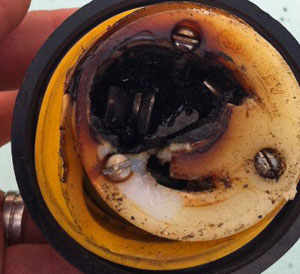Does My Shore Power System Need a Voltmeter?
The ABYC does require an AC voltmeter on your electrical panel when certain equipment is installed.
January 3, 2014

This simple panel from Blue Sea Systems shows the status of AC voltage available from shore power. In this case, the voltmeter would not be required by ABYC standards for the water heater, which does not run a motor.
Question: I’ve been thinking of upgrading my older boat with a new power distribution panel for my AC system like the one shown in the photo from my friend’s boat. I have a question, though, about the voltmeter shown in the picture. I’ve heard that not all AC panel boards need to have a voltmeter installed. My buddy says he’s pretty sure they are a requirement under ABYC standards. What’s the story here?
Answer: The story here is actually quite simple. ABYC does require an AC voltmeter to be installed on any boat with an AC shore power system that is supplying an AC electric motor and/or is equipped with an AC generator. The panel you show from Blue Sea Systems is a nice simple panel that is designed for the most basic of systems. It includes the requisite double-pole main breaker and a reverse polarity indicator, both required in most all situations. The AC voltmeter is installed, I’m certain, because it’s impossible to determine what end-users are going to have installed for equipment. Based on what’s shown in the photo, it looks like a water heater, which would not require the voltmeter.
Probably the most common small-boat shore power configuration would have the shore power running a battery charger and a microwave oven, and possibly an AC refrigerator, with one or two additional duplex receptacles to power small appliances. In that mix, the compressor motor for the refrigerator would be the AC motor to be concerned about.
The reason the ABYC wants an AC voltmeter installed is to monitor the voltage supply. The concern is over a lower-than-desired voltage supply, which raises current levels and may induce motor overheating, causing early failure.
So, depending on what your system consists of, you may or may not need to have an installed AC voltmeter to be compliant with ABYC Standards.












